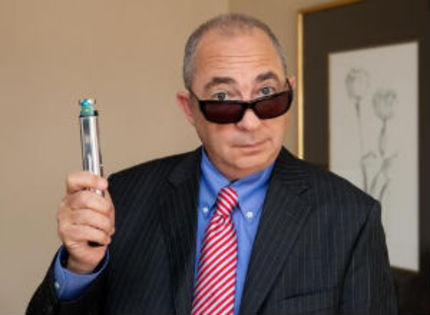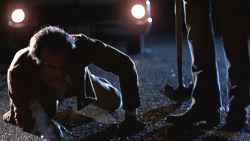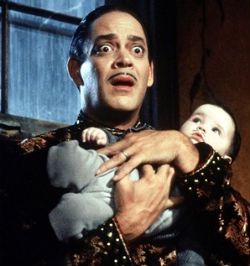Hollywood Grind: Barry Sonnenfeld and the Value of a Journeyman

The sequel that the original deserved, Men in Black 3 is not exactly fresh, but it is an honest journeyman's effort by director Barry Sonnenfeld, and features a peachy-fine performance by Josh Brolin, who easily outshines putative star Will Smith.
That in itself is something of an accomplishment; Smith has been so hell-bent on creating and maintaining a bad-ass indestructible uber-macho on-screen superior smirking presence over the past decade that he's become nearly insufferable. It's something of a refreshing marvel to see Smith play second banana to Brolin.
Did Smith himself realize, after four years away from the screen, that he needed to dial it down, or did Sonnenfeld encourage him along a goofier, more relaxed, more empathetic path? Either way, it works, and clears the road for Brolin to deliver an easygoing piece of work, suggesting (but not entirely imitating) the younger Tommy Lee Jones.
That's all part of the highly-skilled craft involved in being a journeyman director. To be clear, by using the term "journeyman," I'm not damning with faint praise or denigrating Sonnenfeld's talents. Instead, I have in mind the idea of an educated apprentice who has learned his trade and has been practicing it effectively and professionally for years. Sonnenfeld may not be a master filmmaker, but he is fully capable of making sprightly, pleasing entertainment, and that's no easy task in today's environment of studio-driven, big-budget, blockbuster pictures.
 In the 30s and 40s, Sonnenfeld would likely have made a good living handling whatever assignment he was given by a studio. He would have made more pictures in more genres; it's easy to imagine him handling a swashbuckler followed by an adventure in the desert followed by a screwball comedy followed by a "woman's picture" followed by a chamber drama. Perhaps he would have started in the Silent Era as a cameraman, serving his apprenticeship in that field before convincing an enterprising producer that he had the right stuff to call the shots.
In the 30s and 40s, Sonnenfeld would likely have made a good living handling whatever assignment he was given by a studio. He would have made more pictures in more genres; it's easy to imagine him handling a swashbuckler followed by an adventure in the desert followed by a screwball comedy followed by a "woman's picture" followed by a chamber drama. Perhaps he would have started in the Silent Era as a cameraman, serving his apprenticeship in that field before convincing an enterprising producer that he had the right stuff to call the shots.
In reality, Sonnenfeld found his calling while attending NYU in the early 1980s, initially shooting nine porn films in nine days before fortuituously meeting fellow NYU graduates Joel and Ethan Coen, who needed a cinematographer for a trailer intended to raise money for their first feature. Sonnenfeld photographed both the trailer and the feature: Blood Simple.
Sonnenfeld's work with the Coens extended to the brightly comic Raising Arizona and the darkly artificial Miller's Crossing, but during this period he also shot Danny DeVito's black comedy Throw Momma From the Train, as well as Rob Reiner's nostalgic romance When Harry Met Sally and murderously dramatic Misery.
 He moved into the director's chair withThe Addams Family, which was financially successful, followed by For Love of Money, which was not. The two films marked his comedy territory, however, the former mining laughs from deadpan expressions and ornate production design, and the latter showcasing a frantic lead (Michael J. Fox) against a backdrop of a dispassionate, beautifully detailed world. Neither film had a strong script -- The Addams Family relied upon its premise and For Love of Money leaned heavily on Fox's somewhat limited charm and star power -- yet they showed that Sonnenfeld could squeeze as much juice as possible out of his material.
He moved into the director's chair withThe Addams Family, which was financially successful, followed by For Love of Money, which was not. The two films marked his comedy territory, however, the former mining laughs from deadpan expressions and ornate production design, and the latter showcasing a frantic lead (Michael J. Fox) against a backdrop of a dispassionate, beautifully detailed world. Neither film had a strong script -- The Addams Family relied upon its premise and For Love of Money leaned heavily on Fox's somewhat limited charm and star power -- yet they showed that Sonnenfeld could squeeze as much juice as possible out of his material.
Courtesy of credited screenwriters Paul Rudnick and Scott Frank, respectively, Sonnenfeld delivered better movies in Addams Family Values and Get Shorty because he had better material, with more richly-delineated characters that allowed his comic instincts to accent rather than substitute for depth.
And those films set up the success of Men in Black, featuring wonderful chemistry between grizzled character actor Tommy Lee Jones and ascending star Will Smith. Their relative positions in the celebrity firmament reflected their relationship in the movie, with Jones training Smith, knowing (and accepting) that the younger man will eventually rise to greater prominence.
Sonnenfeld stumbled badly with Wild Wild West, Big Trouble, and Men in Black II in the next few years, and RV was pretty much a complete disaster. It's not so much that Sonnenfeld lost his touch as much as it is true that the material was not good enough. Certainly, the studio director who does not write his own material can shape and influence the script; Sonnenfeld maintains he did this with the original Men in Black but was unable to do so sufficiently with Wild Wild West and Men in Black II, as examples. Beyond that, the director is responsible for a film's tone, and Sonnenfeld acknowledges the glaring problems in that regard on Wild Wild West.
And that's why Men in Black 3 is such a pleasant surprise. Whatever behind-the-scenes turmoil the film may have suffered -- rumors were rife that production shut down so the script could be rewritten, among other reported tribulations -- what counts, finally, is what's on the screen. It's not as good as the original, but it is definitely an improvement on the sequel, and that, too, is the mark of a respectable journeyman. As a consummate professional, Barry Sonnenfeld deserves a commensurate degree of respect for his craftsmanship.
Hollywood Grind is a column on filmmakers working within and through the studio system. Men in Black 3 opens wide in North America on Friday, May 25.







